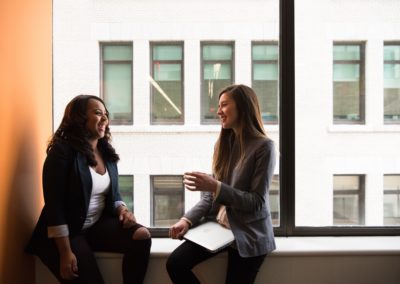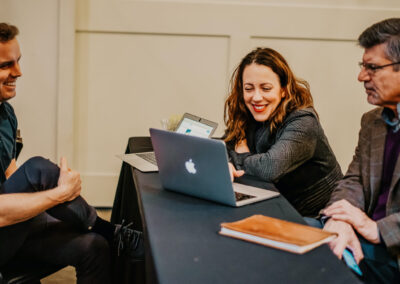 Startup founders face many challenges and obstacles in their journey that test their perseverance and success. For female founders these challenges and obstacles are often amplified. Two of Jumpstart’s female founders share their strategies and secrets that contributed to the success stories of their companies.
Startup founders face many challenges and obstacles in their journey that test their perseverance and success. For female founders these challenges and obstacles are often amplified. Two of Jumpstart’s female founders share their strategies and secrets that contributed to the success stories of their companies.
Stephanie Schull, PhD founded Kegelbell after her mother fell chronically ill after surgery for her pelvic muscle. The pelvic muscle is the part of the body responsible for supporting the health of the bladder, uterus, and vagina. Prior to Kegelbell, most women seeking to alleviate the debilitating symptoms encounter dangerous and ill-conceived solutions. Stephanie founded Kegelbell because she was “deeply moved when I discovered how much women suffer as a result of weak pelvic floors.” To her, it was also clear that the marketplace was motivated by forces that would never offer a safe, natural, effective, and affordable solution for women.
Heather Waibel led international operations teams at Paypal, which put her in a unique position to see how PayPal offers health and wellness programming at different locations within the company. Through her travels, Heather “observed that some locations had fitness options like weekly yoga, and healthy food like paleo pancakes catered in, but other locations had limited food choices and no fitness options.” Based on her observations, she couldn’t help but wonder why employees at the same company received different levels of support and resources for their health and wellbeing. The answer was that the choices for health and wellness support were decided by the local site and not the PayPal benefits team. Her experience at PayPal inspired Heather to start Welnys, a solution that provides a centralized way for companies to implement, manage, and get insights back on their wellness program, company-wide.
Strategies, Secrets, and Successes
What have you enjoyed about being a female founder and how have you grown personally / what have you learned about yourself?
Stephanie:
What I enjoyed most about being a founder is learning and trying to get to a level of mastery with the various roles I play within the company. I serve all the roles from filing patents, bookkeeping, writing ad copy, designing packaging, website design, social media posting, customer service, fundraising, Facebook ad creation (it is its own universe!), supply chain management, public presentations, FDA registration, create a brand voice…
I learned that my innate curiosity about how the world works and my ability to do research that I practiced for twenty years when I was a Philosophy Professor were going to serve me well in the business world. I feel comfortable wading unfamiliar waters. I don’t panic, I just trigger the learning process and I am confident I will figure it out through study and interviewing people who are experts.
The years I’ve spent building the business have been the most fulfilling and enjoyable of my life. I often say to myself that I want to do as many things as possible given women were previously denied access to working in these fields, and only recently has it been possible for me as a woman to do what I am doing.
To make up for the lost time and embrace the possibilities that were denied to my grandmother, I welcome the chance to try as many things I can until I can’t work anymore.
Heather:
The thing I enjoy most about being a founder is learning about myself. Starting your own company is like holding a mirror up to yourself in a way that you just can’t in any other career. You learn surprising things that you are really good at, or really enjoy, that you never would have tried if you were not forced to wear so many hats as a founder (for me it was sales and public speaking). You also learn where your gaps are, things you need to work to get better at, or things you just really hate and should outsource (for me it is financial modeling and hiring).
You learn what you are made of.
How resourceful you are.
How much grit you have.
Finally, you are forced to reckon with yourself as a leader every single day and ask yourself, am I being a good manager? Am I leading the company in the right direction? Am I inspiring my team?
The growth that you experience as a founder both personally and professionally is amazing, and whether you ultimately succeed or fail, this growth can never be taken away from you, and will serve you well in whatever is next.
What are some strategies you have used to help you succeed?
Stephanie:
I entered the world of medical devices and entrepreneurship with a non-traditional background (Mexican-American and an academic). I turned my lack of experience, knowledge, and contacts into a strategic advantage. I realized I had a fresh approach and could see things differently than those who have been in the industry longer. In addition, since I had no previous experience with the health industry, I asked a wide range of people questions and that created a network of information and contacts that I could utilize in novel ways.
Heather:
The most important strategy I have implemented, and probably the smartest decision I have made as a founder, was to teach myself sales. Sales is a renewable resource. Can’t close funding? Cash flow issues? Sell your way out of it. Trying to close an investor? Get into an accelerator? You’re selling yourself. Driving strategic direction with your team or co-founders? You’re selling your idea.
My background is not in sales, and when I started Welnys, I did not identify as a “sales person” nor did I want to be one. However, I recognized that I needed to understand sales in order to successfully run my company. So, I put myself through a two-week “sales bootcamp” that I designed myself (and wrote about here). I became a student of sales, and to my great surprise, I learned that not only was I pretty good at sales, I actually enjoy it. I’ve personally closed deals with Walmart, The City of Boston, and Mastercard, and there’s no bigger rush than closing a deal.
What challenges have you faced as a female founder and how did you overcome them?
Stephanie:
The biggest challenge has been fundraising, but this has been good for us in two ways. The first is that the more benevolent and forward-thinking groups will invest in women. For example, Jumpstart is our only institutional investor. This filter ensures we only have good people investing in the company. The second benefit comes from the overall lack of funding. This has made us operate very lean and, in turn, develops rigor and discipline while allowing us to be creative.
Heather:
For myself personally, lack of access to funding has been our biggest challenge. Many “early stage” funders want to see revenue of $1M for B2B companies before they will invest- but less than 5% of women-owned companies ever cross $1M in revenue! If we set the bar for early stage funding at a level that most women don’t ever reach, I think it’s easy to see why then women receive less than 3% of all VC funding. In my opinion, one of the solutions to the lack of funding invested in women entrepreneurs is to commit to fund women at the earliest stages. At Welnys, I have overcome this by being incredibly scrappy and focusing on generating revenue and staying cash-flow positive so that we don’t have to rely on investors to keep the lights on.
What advice would you give to other aspiring female entrepreneurs?
Stephanie:
I would share something a fellow entrepreneur in the Jumpstart family made me aware of, namely, a loan program through Clearbanc that generates low-fee loans for e-commerce companies using algorithms that are blind to race and gender. I would encourage female entrepreneurs and people of color to approach programs structured like Clearbanc, as it removes much of the bias that keeps us from getting funding. Their algorithms just look at the raw data generated, and since our numbers are strong and speak from themselves, we get access to capital regularly without having to give up equity.
Heather:
The top 3 skill sets that all early-stage founders should focus on developing is 1) sales 2) networking and 3) public speaking. If you’re committed to becoming great at all three of these things you’re likely to succeed, and further, these skills are transferable and insanely valuable to any future job you have, company you start, and even in your personal life.
These are just two of the many Jumpstart female founder success stories. If you would like to learn more about becoming a Jumpstart Founder and the Jumpstart Founder experience, check out this webinar and subscribe to our newsletter.



